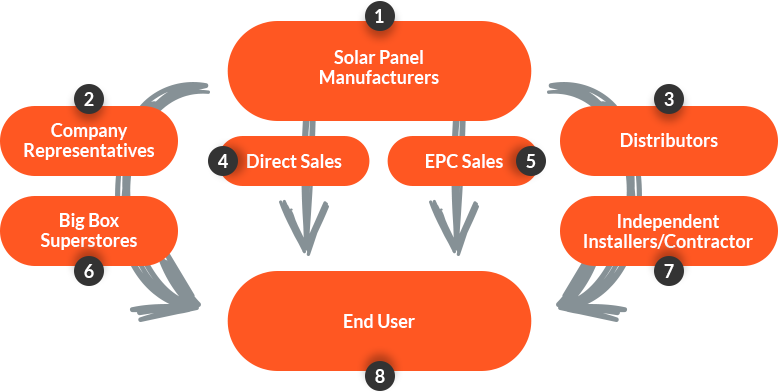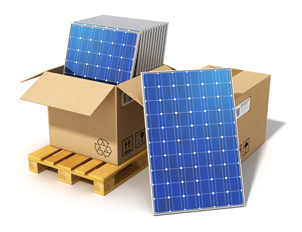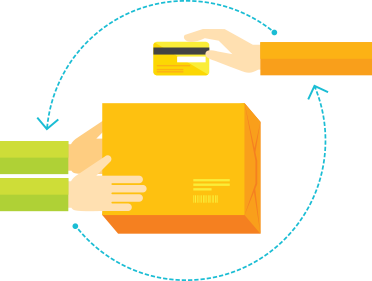Everyone wants a deal. And when you’re investing in a solar energy system for your home, of course, you want the best one possible, for the best price tag. This guide provides the information consumers need to get the best solar panels for the best prices by purchasing wholesale – without getting burned in the process.
But first, take our quick quiz and test your knowledge on the wholesale solar panel market:
Wholesale Solar Quiz
1. Thanks to the Internet and globalization, it’s easy to find wholesale prices for my home’s solar system.
While it might be easy to find prices advertised as “wholesale,” discount pricing doesn’t really kick in until you buy larger quantities than most homes need (at least 30 panels, often more).
2. You know you’ve gotten a great deal on an installed solar system when you’re paying about $3.40 per watt.
The average cost per watt on installed home solar systems in 2019 is $3.70 in the U.S., according to the Lawrence Berkeley National Laboratory. This includes all costs, from your panels to permitting, engineering, accessory equipment, and installation.
3. Solar panel requirements, rebates and installation codes are all covered by federal law. There’s no need to check with local authorities about the panels you plan to connect to the utility grid.
Every state has different codes, requirements, and financial incentives for solar systems. Local utilities also have specific requirements for grid-tie systems.
4. Despite what deals you might see advertised, there’s no such thing as a “complete” solar kit.
The materials in solar kits make up less than 50 percent of the costs of solar. Other costs include permits, engineering fees, accessory materials (wire, conduit, fasteners, etc.), and labor.
5. I just bought a complete solar kit at my favorite big-box store. I’m going to save money by installing it myself. Sure, I’ve never installed a solar system, but it’ll be easy.
Unless you’re a professional contractor, you’re probably headed for trouble. Installing home solar systems requires specialized equipment, a thorough knowledge of local codes and public utility tie-in specifications, not to mention dealing with potentially fatal electricity.
The Ins and Outs of Wholesale Solar Panels
Thanks to the Internet and globalization, this is a great time to be in the market for solar panels — lots of companies around the world want your business, and many claim to have the best equipment for the lowest prices.
Many companies claim to offer ‘wholesale’ pricing, but it’s always good to check the actual total cost of installing the system. While panels or inverters may appear to be offered very inexpensively, other aspects of the project may be overpriced, resulting in a higher total installed cost.

Brilliant Harvest solar company
It should be no surprise to you, savvy shopper, that some advertised “wholesale” pricing isn’t really wholesale. A recent New York Times story showed how many online discounts aren’t really discounts at all. Even worse, some online sellers are simply trying to scam you into buying low-quality panels, or panels that leave frightful environmental and social scars in communities where they’re manufactured.
So how can you tell the difference? Keep reading to get the right solar panels at the best price, as well as other facts you’ll need to know before investing in the sun.
What is Wholesale?
The definition of “wholesale” is the business of selling things in large amounts to other businesses rather than to individual customers.
Most of the products you see on the shelves of your favorite store did not come straight from the factory, farm or manufacturer.
In the past, distributors (a.k.a. middlemen) purchased manufacturers’ products in bulk quantities, then delivered them to the stores where you buy them. Today’s online, global economy makes this equation more complicated. Here are the avenues for buying solar systems today:

Source: Frost & Sullivan market research
Solar Panel Distribution Pathways
The source you choose for your solar system depends on whether you want to do the work yourself or you plan to hire a contractor. Be careful. Unless you know what you’re doing, saving money up front could cost you more in the long run.
In today’s economy, there are several paths your solar equipment can take from the manufacturer to your home. The right path — and the best price — depends on your particular situation.

Most customers prefer “Made in the USA” solar panels, because of higher manufacturing, labor and environmental standards, not to mention warranties and legal recourse in case of defects. Most are willing to pay a higher premium for these assurances. But hundreds of overseas companies can offer panels at significantly lower prices—but without the guarantee of quality, warranty, and environmental and labor standards.
Manufacturers often have agents whose job it is to convince retailers to carry their products. Retail stores have buyers, whose job it is to find the products the stores will carry. These two meet each other at the convention to decide which systems you’ll see in your favorite stores’ catalog.
Traditional middlemen buy equipment in bulk, and then they resell the equipment to contractors and installers. Large contractors/installers with enough volume and clout can bypass distributors and buy directly from manufacturers.
Thanks to the World Wide Web, you and manufacturers can deal directly, but not all manufacturers have the marketing, sales and delivery staff to handle your tiny order. Often, they will only sell directly to end-users when the purchase is in large quantities.
These are the guys building the massive solar projects out in the California desert. They buy direct from manufacturers, because they’re buying panels by the hundreds.
Superstores buy in extreme volume and can demand the lowest price from manufacturers, which is why your favorite big-box store can undersell many others — but your choice of product and necessary accessories may be limited. And once you buy here, you have to figure out how to install it. And does it even fit local code?
These are your local solar contractors and installers. They’re experts in home solar installation — they know the local codes and rules. They also have kids in your local schools and pay taxes to fix the potholes you both share on local roads. Supporting them — even if you have to pay a few dollars more — supports your local economy and community.
This is you – happy you made the right choice when shopping for your solar system. End users are also the schools, government buildings, and utility-scale solar installations out in the desert. Each of these end users has different buying capacities and equipment needs. What works for them might not work for you. Understand this while you’re doing your research.
Getting the Best Deal on Panels
Although true “wholesale” deals are hard to find, good deals aren’t, if you’re patient and do your research. Here are a few tips:
Solar Panels Online: Are You One Click Away from Energy Independence?
Companies around the world—from the United States to Australia, China and elsewhere—are vying for your dollars. Some of these products are high-quality, made by people who care about craftsmanship and value. Some of these sellers don’t really have “wholesale” prices – despite their advertisements — but that doesn’t mean you should avoid them. They’re just trying to compete in a difficult market; they’re using marketing strategies they know will attract customers. They might be the most knowledgeable, service- and quality-oriented people you’ll ever find, who will provide exceptional service and value.

The digital double-edged sword of the Internet also allows unscrupulous sellers to hawk poorly made, damaged or otherwise unwholesome goods. Unfortunately, it’s difficult to tell the good from the bad simply by looking at advertisements on a web page.
“The market for solar PV is exploding globally and, because of this, there are companies around the world and in the U.S. that are willing to cut corners to gain market share,” warns Johnson, founder, and president of Brilliant Harvest. “These defects are often not visible to the average consumer but result in lower-than-rated power output, possible safety issues, and long-term durability problems. Many outlets will offer ‘wholesale’ grade B or scratch and dent panels with no warranty in place. These are much more likely to have issues in terms of workmanship and durability over their expected 25-year life span.”
The best thing you can do is to understand your needs and know what questions to ask to avoid getting scammed. Then trust your instincts: If a deal sounds too good to be true, it probably is.
Danger: According to the U.S. Consumer Product Safety Commission, roughly 400 people die each year from electrocution around the home. Don’t become one of these statistics. Hire a professional, licensed electrician to install your solar system.
What to Know Before Buying Your Panels
Panels are just one part of your home’s energy independence. Before you buy panels, consider everything else you’ll need, so you can make sure you’re getting the best deal:
What size system do you need? With a big-enough system (20 to 30 panels or more), you might qualify for a bulk discount.
Your favorite big-box store is able to sell for less because they buy in enormous quantities. Often these come in “complete kits” that market themselves as “everything you need” to start your personal age of solar independence. But keep reading, and you’ll see these kits don’t tell you about other critical parts of your home solar project.
Most professional installers will not install equipment that they don’t furnish since they would be responsible for any warranty repairs needed and they have no way of knowing the quality of materials in the kit. Also, in a few years, that big-box retailer won’t have any idea what the kit was or who manufactured it. So getting warranty support is next to impossible. The local licensed solar contractor will provide the support and service needed to keep the system running for its entire lifespan, at maximum efficiency.

Brilliant Harvest solar company
Does the system meet building codes or grid-tie specifications in your community? Does your local Home Owners Association have requirements? Some communities require professional installation by licensed contractors.
Will you be able to find a contractor willing to install what you bought? Ask them, is there any reason they might not be willing to?
There are many chances a contractor would not want to install a solar kit. For example, we wouldn’t install it because we didn’t vet the manufacturer or the supplier. We need to have confidence in the equipment we’re installing. Contractors also might not be familiar with the mounting methods, so it can be hard to estimate labor.

AMECO Solar
Upfront cost is just one of the considerations to investigate when looking to purchase a solar PV system. Think also about how much energy the system will produce and how much maintenance is required over the life of the system. A system that costs less upfront may produce a lot less energy and result in a lower return on investment than a more expensive system that produces far more energy. What you think is a great deal on an unknown panel may turn out to be a bad deal in the long run.

Brilliant Harvest solar company
The best benefit of online shopping is being able to compare prices of various brands, models, and sellers before you buy. The same holds true for local contractors.
“Spend some time reading the trade magazines like Solar Power World and Renewable Energy World,” says Johnson. “Understand what “cost per watt” means. Take the time to learn about the top manufacturers, then interview three or four reputable contractors, check their licenses and their references. Choose the one you prefer (who likely has two, three, or more panel options available at any one time). Then sit back and enjoy the savings on your electric bill.”
Most companies will provide you with an estimate free of charge. So you might as well get three estimates to see what the professionals have to say before you buy.

AMECO Solar
Does this purchase come with a warranty? What will happen in a few years if the manufacturer goes out of business? Will they still stand by their product?
Does your purchase include all the components necessary to make the solar system work (frames, inverters, wiring, grid-tie circuit set up, battery backup system)?
Does the deal seem too good to be true? It probably is.
If the pricing is too good to be true, there’s likely a reason. Either it is an old product like a 250-watt module – we’re currently installing 315-watt panels – or there are visible defects a consumer would not see, such as hot spots.

AMECO Solar
Shopping locally, or at least from a reputable dealer, contractor or installer, can help protect you. These dealers know it’s not worth risking their reputation and future business by trying to scam people. You also have legal recourse by being able to go after them for fraud or negligence.
Licensed solar contractors bring a wealth of experience to each project they encounter. They know the best products to use in each situation and have access to equipment, materials, and techniques that homeowners simply do not. A professional, licensed contractor knows that his reputation is what keeps him in business, so he will stand behind his work and make sure that the job is done correctly.

Brilliant Harvest solar company
Rolex, Gucci, and other top brands suffer from copycats. Solar panels are no different. Underwriters Laboratories, the quality-assurance certifier for many consumer products, has reported several cases of solar panels with counterfeit UL logos on their labels. UL certification provides a level of confidence with the safety of the product.
Modules look similar and except for a few names printed on them, it’s hard to tell them apart. This is why we go through manufacturers directly, or distributors we have developed a relationship with.

AMECO Solar
Other Discounts: Rebates, Conservation, Surplus
Can’t afford the up-front costs of a residential solar system. Then you might be interested in a lease agreement, Power Purchase Agreement (PPA), or loan – some of which may be accessible for 0 percent down.
Learn more about financing options Rebates and Tax IncentivesThrough 2019, homeowners in the United States who install solar for new and existing homes are eligible for a 30 percent federal tax credit on all costs associated with the installation, including labor and equipment costs, with dropdowns in 2020 to 26 percent and 22 percent in 2021. There might be additional rebates or incentives offered in your state. Check out your own state page to see what’s available.
Learn more about tax credits ConservationThe cheapest electricity is that which you don’t buy because you don’t need it. Before embarking down the path toward solar independence on your home, first reduce the amount of energy your home uses, reducing the size of the system you need.
Learn more about energy efficiency Buy SurplusIn our up-and-down consumer economy, companies occasionally have too much product on hand, or they go out of business and need to sell off their inventory. Other companies purchase surplus or discontinued models and resell them to homeowners. But take care. Older panels may not meet modern efficiency or technical specifications.
Learn more about discount solar panels

